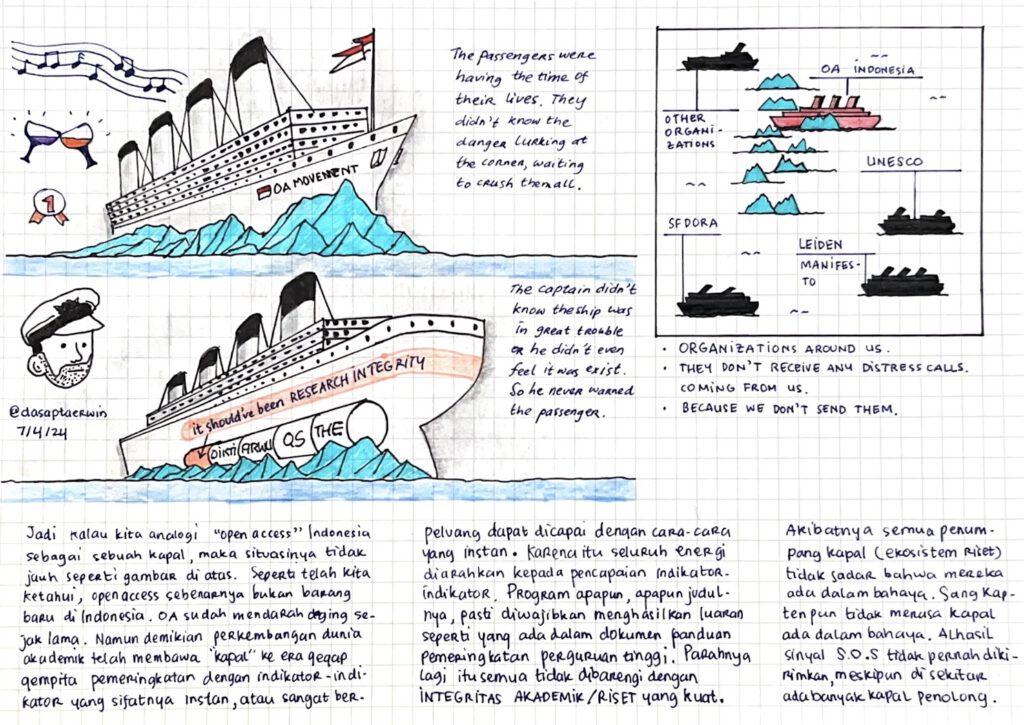If we compare open access (OA) in Indonesia to a ship, the current situation is somewhat unstable. Although open access is not a new concept in Indonesia and has been in place for some time, changes in the academic world have caused this “ship” to rock.

The intense focus on rankings and quick indicators has shifted all attention towards meeting these benchmarks. Consequently, each program, regardless of its unique nature, is now expected to produce outputs that align with the global university ranking guide.
The most concerning issue is the lack of strong academic or research integrity accompanying this shift. As a result, all members of the research ecosystem, likened to passengers on a ship, are unaware of the impending danger. Even the leader, akin to the ship’s captain, is oblivious to the peril. No distress signals are sent out, despite the availability of numerous potential rescue options.
The ships around us offering rescue:
- UNESCO with their recommendations on Open Science:
- Open Science Principles: Advocates for making scientific research accessible to all, emphasizing inclusivity, equity, and sustainability in knowledge production.
- Guiding Framework: Offers an international definition, shared values, and principles for open science, along with actions for fair implementation at various levels.
- Global Impact: Aims to address complex challenges and contribute to the Sustainable Development Goals by promoting accessible, inclusive, and transparent science.
- Member States’ Commitment: Encourages countries to adopt common standards for open science, established through a consultative process and adopted in 2021.
- Leiden Manifesto (article)
- Data-Driven Evaluation: The article discusses the shift from peer-based research evaluation to metrics-based systems, emphasizing the risks of relying solely on data without expert judgment.
- Metric Proliferation: It highlights the increase in various metrics, like the h-index and journal impact factors, and their potential misuse in academic evaluations.
- Leiden Manifesto: The authors present the Leiden Manifesto, which outlines ten principles to guide responsible use of metrics in research assessment.
- Principles for Metrics: These principles include aligning metrics with research missions, maintaining transparency in data collection, and avoiding over-reliance on quantitative measures.
- SFDORA
- DORA Initiative is a global initiative that began in 2012. Its main objective is to holistically improve the way in which scholarly research outputs are evaluated. The movement focuses on fostering a fairer, more comprehensive evaluation system that accurately reflects the quality and impact of academic research. It encourages the academic community to move beyond traditional metrics and consider a wider range of factors when assessing the value of scholarly work.
- Mission Goals: This initiative is primarily aimed at promoting the development and implementation of robust methods for research assessment on a global scale. It strives to cover all disciplines, thereby ensuring that scientific progress and discoveries in every field are accurately and fairly evaluated. This commitment to improving research assessment methodologies is integral to maintaining the integrity and credibility of scientific endeavors worldwide.
- Activities: The activities encompass a wide range of efforts aimed at societal improvement. They include raising awareness about critical issues that affect our community, facilitating policy development to provide solutions to these problems, catalyzing change by instigating necessary actions, improving equity to ensure everyone gets a fair chance at success, and engaging the community in all our initiatives to foster a sense of unity and shared responsibility.
- Others like: Sains Terbuka Indonesia (Open Science Indonesia)
- There’s an urgent need for change in the assessment of scientific research outputs by funding agencies, academic institutions, and other entities. This necessity is underscored by the numerous misconducts discovered recently, demonstrating the importance of increasing transparency and accountability in scientific research.
- San Francisco Declaration on Research Assessment (DORA): This introduces DORA, which offers suggestions to overcome the limitations of the Journal Impact Factor (JIF) as a measure for research quality.
- The declaration emphasizes the need to strengthen research and academic integrity, proposing recommendations such as eliminating the use of journal-based metrics like JIF in research funding, appointment, and promotion considerations. It also suggests assessing research based on its own merits rather than the journal in which it is published.
- Broad Support: The page encourages individuals from diverse scientific fields to endorse the declaration by adding their names as signatories.
